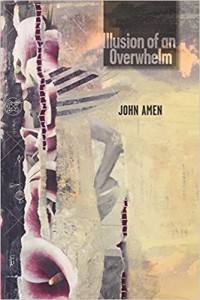Book Review
The sharply intellectual Illusion of an Overwhelm is immersed in the visual art scene, an exhibit living on the page. Resisting single interpretation and clear narrative, John Amen pushes against the conventional through poems that take part in multiplicity. Comprised of four complex poems, this collection homes in on what it means to be an artist working in visual mediums as well as the existential and physical struggles that often accompany such artistic endeavors.
Amen delves into myth—albeit sideways—where hegemonic forces act upon the figures in these poems. In the section titled “American Myths,” urban spaces are falling apart, scarred by white patriarchal control. The eighth section, “Cleveland/Philadelphia,” is the location where “the wrath of the white God is systemic, / a secret ingredient in your dead mother’s / blood casserole.” The raw brutality in these visceral lines crafts an unyielding and unforgiving mythos. The abused son, a figure who consistently emerges throughout these poems, spends “nine months in the dead mother’s womb, / decades under the white father’s tongue.” In the untitled fifteenth section, this tension between son and father continues, where “every word flies in two directions, we / use Jacksons to split a black son, bury you in the numbers.” A racist American heritage is ever-present, putting pressure on a son who struggles to survive against the odds, for whom the future remains a question mark.
The multipart “Hallelujah Anima,” which opens the collection, hinges on the uncertainty of present and future narratives. The speaker is constantly reminded not to rely on one way of looking at the world or of shaping the self, confessing in the twelfth section, “I’ve mastered being in several places at once, / how to answer to multiple names.” The speaker must keep a reminder of how to resist such singularity: “I have to remember / not to be seduced by a single narrative, / that her song’s one of a thousand narratives.” Such resistance is contingent upon the speaker’s ability to provide multiple avenues for the reading, never settling down on one straight path through the collection. The reader is constantly advised of this move in the meta-address, which snaps the reader out of complacency. Skepticism is key, even when fashioning one’s own creation myth, such as in the tenth section of the poem: “This is your myth of origin, how your precious exile began—this is the way you convince yourself you don’t belong, so you don’t.” Self-perception morphs into reality.
With a significant portion of the collection dedicated to friends who have participated inside and outside of the art scene, Amen broadens the collection’s scope to more than just poetry. Oftentimes, these poems are defensive and protective of these visual artists. In the sections “My Gallery Days” and “Portrait of Us,” Amen brings together art and poetry—not through ekphrasis, but through the materials and lives around the paintings. In the sixth section of “My Gallery Days,” dedicated to Leslie, the speaker addresses the fraught relationship between established and street art, noting, “interpretation so often exceeds intention, / why’s it always the waif / who’s accused of being the witch?” These poems garner sympathy for these artists, who are constantly struggling to showcase their art in whatever mediums possible. The tension between the “gallery” and the “street” is made apparent in this poem, where the speaker defends the artist’s innocence in her street art. Despite the move to maintain some kind of permanence with visual art, especially when preserved in the gallery, the speaker knows this preservation is futile. By the end of the sequence, the speaker and the other artists must face the ephemeral nature of living and what is left behind in art: “We fled ourselves / for a season, clutching our self-portraits, / we were ghosts long before we knew it.”
While oftentimes esoteric and inaccessible in terms of direct knowledge (so much is withheld by these speakers), the poems in Illusion of an Overwhelm step outside of scenes and myths into pressing questions: of existence; of being, time, and place; and of institutional forces that so govern everyone’s lives. This skepticism keeps the poems sharp and full of critique, asking readers to pay close attention to privilege, power, and who is afforded what, particularly in America. Readers must give art its due, acknowledging these artists and their struggles in the intricate politics of the art world. As the collection’s final long poem, “Portrait of Us,” points out, “the only salvation greater than love / is the possibility of love.” These poems provide that possibility, opening up worlds for the reader to enter and navigate, returning changed and full of potential. As Amen reminds us, there is no set trajectory.
About the Reviewer
Alyse Bensel is a PhD candidate in literary studies and creative writing at the University of Kansas. Her recent poems have appeared in the Adroit Journal, Tinderbox Poetry Journal, Quarterly West, New South, Bone Bouquet, and elsewhere. She is the author of two chapbooks, Not of Their Own Making (dancing girl press) and Shift (Plan B Press), and serves as the Book Reviews Editor at the Los Angeles Review.
